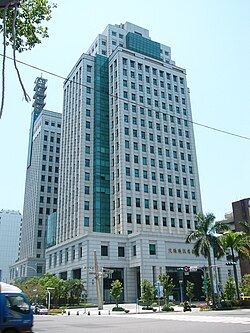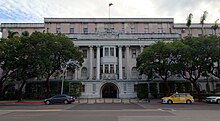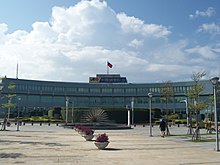Ministry of Transportation and Communications (Taiwan)
| 中華民國交通部 Jiāotōngbù (Mandarin) Kâu-thûng Phu (Hakka) | |
 Seal of the Ministry of Transportation and Communications | |
 | |
| Agency overview | |
|---|---|
| Formed | 3 January 1912 |
| Preceding agency | |
| Jurisdiction | Taiwan |
| Headquarters | Zhongzheng, Taipei |
| Ministers responsible |
|
| Parent agency | Executive Yuan |
| Website | www |
The Ministry of Transportation and Communications (MOTC; Chinese: 交通部; pinyin: Jiāotōngbù; Pe̍h-ōe-jī: Kau-thong-pō͘) is a cabinet-level governmental body of the Republic of China (R.O.C.) in charge of all policy and regulation of transportation and communications networks and administration of all transportation and communications operations and enterprises in Taiwan.
History
[edit]

The Ministry of Transportation and Communications in its current form can be traced back to the post-WWII merger of two earlier ministries, namely the earlier iteration of the Ministry of Communications of the ROC (founded in 1912 by the Beiyang government to succeed the former Ministry of Posts and Communications of the later Qing Dynasty), and the Communications Department of the Transportation Bureau of the Governor-General of Taiwan.
Until 2006, the MOTC was also responsible for regulating Taiwan's broadcasting and telecommunications sector, as well as said country's frequency allocations and spectrum management, when that function was split off into a new statutory body called the National Communications Commission.
Introduction
[edit]In Taiwan, transportation and communications operations comprise four categories: communications, transportation, meteorology, and tourism. The Ministry of Transportation and Communications is responsible for making policy, formulating laws and regulations, and overseeing operations in the area of transportation and communications.
Communications operations encompass postal services and telecommunications. Postal services are managed by the Chunghwa Post. Regarding telecommunications, the MOTC is responsible for the overall planning of communications resources, assisting and promoting the communications industry, and fostering universal access to communications.
Transportation operations are divided into land, sea, and air transportation.
Land transportation comprises railways (including conventional railways, mass rapid transit, and high-speed rail) as well as highway transportation. Conventional railways is operated by the Taiwan Railways Administration. Mass rapid transit systems are managed by local governments. High-speed rail is managed by the Taiwan High Speed Rail. Highway transportation is managed by the Directorate General of Highways. Expressways are constructed and maintained by the Freeway Bureau.
Sea transportation consists of water transport and harbors. Shipping carriers of water transport are privately operated, while harbors are operated by the Taiwan International Ports Corporation.
Air transportation includes airline companies and airports. Airline companies are privately operated, while airports and flight navigation services are operated by the Civil Aeronautics Administration.
The Central Weather Bureau under this ministry handles all national meteorological operations.
The Tourism Bureau under this ministry provides planning and oversight for tourism development.
Organization
[edit]



The administrators of MOTC include the Minister, Executive Vice Minister, and two Administrative Deputy Ministers.
MOTC is divided into an Internal Division and an External Division.
Internal division
[edit]Secretariat, Office of Technical Superintendents, Office of Counselors, Department of General Affairs, Department of Personnel, Department of Civil Service Ethics, Department of Accounting, Department of Statistics, Legal Affairs Committee, Petition Reviewing Committee, Road Traffic Safety Committee, Office of Science and Technology Advisors, Information Management Center, Transportation Mobilization Committee, Department of Railways and Highways, Department of Posts and Telecommunications, Department of Navigation and Aviation, Transportation and Communications Management Unit.[1]
Administrative agencies
[edit]- Freeway Bureau
- Civil Aviation Administration
- Tourism Administration
- Highways Bureau
- Central Weather Administration
- Railway Bureau
- Maritime and Port Bureau
- Institute of Transportation
Government corporations
[edit]- Chunghwa Post Co., Ltd.
- Taiwan Railways Corporation (formerly the Taiwan Railways Administration)
- Taoyuan International Airport Corporation
- Taiwan International Ports Corporation
- Kaohsiung Port Land Development Corporation, Ltd. (co-owned by Taiwan International Ports Corporation and Kaohsiung City Government)
List of ministers
[edit]
Political party: Kuomintang Non-partisan/ unknown Democratic Progressive Party
In the latter half of the 20th century, the ministry was created by merging the separate ministries of Transportation (c. 1912), Communications (c. 1938), and Railways (c. 1928 replacing the earlier iteration of the Ministry of Communications and links to the Ministry of Posts and Communications of Imperial China).
- Sun Fo Minister of Communications (1926 - 1927), Minister of Railways (1928-1931)
- Wang Boqun (1927 – 1931)
- Chen Mingshu Minister of Communications (December 1931 – October 1932)
- Huang Shaohong (July 1932 – December 1935)
- Chu Chia-hua Minister of Communications, Minister of Transportation (October 1932 – December 1935)
- Yu Feipeng (1935) (acting)
- Ku Meng-yu Minister of Railways (1932 - 1935), Minister of Transportation (1935 – 1937)
- Yu Feipeng (March 1937 – 1938)
- Chang Kia-ngau Minister of Railways (1935 -1938), Minister of Communications (1938 – 1942)
- Zeng Yangfu (December 1942 – February 1945)
- Yu Feipeng (February 1945 – May 1946)
- Yu Ta-wei (May 1946 - May 1948)
| No. | Name | Term of office | Days | Party | Cabinet | |
|---|---|---|---|---|---|---|
| 1 | Yu Ta-wei (俞大維) | 31 May 1948 | 8 February 1949 | 253 | Independent | Weng Wenhao Sun Fo |
| — | Ling Hongxun (凌鴻勛) | 8 February 1949 | 21 March 1949 | 41 | Kuomintang | Sun Fo He Yingqin |
| 2 | Duanmu Jie (端木傑) | 21 March 1949 | 1 February 1950 | 317 | Independent | He Yingqin Yan Xishan |
| — | Yan Xishan (閻錫山) | 18 December 1949 | 1 February 1950 | 45 | Kuomintang | Yan Xishan |
| 3 | Chen Liang (陳良) | 1 February 1950 | 15 March 1950 | 42 | Kuomintang | Yan Xishan Chen Cheng I |
| 4 | He Zhong-han (賀衷寒) | 15 March 1950 | 1 June 1954 | 1539 | Kuomintang | Chen Cheng I |
| 5 | Yuan Shou-chien (袁守謙) | 1 June 1954 | 23 July 1960 | 2244 | Kuomintang | Chen Cheng I Yu Hung-Chun Chen Cheng II |
| 6 | Shen Yi (沈怡) | 23 July 1960 | 11 December 1967 | 2697 | Kuomintang | Chen Cheng II Yen Chia-kan |
| 7 | Sun Yun-suan (孫運璿) | 11 December 1967 | 11 October 1969 | 670 | Kuomintang | Yen Chia-kan |
| 8 | Chang Chi-cheng (張繼正) | 11 October 1969 | 1 June 1972 | 964 | Kuomintang | Yen Chia-kan Chiang Ching-kuo |
| 9 | Kao Yu-shu (高玉樹) | 1 June 1972 | 11 June 1976 | 1471 | Independent | Chiang Ching-kuo |
| 10 | Lin Chin-sheng (林金生) | 11 June 1976 | 1 December 1981 | 1999 | Kuomintang | Chiang Ching-kuo Sun Yun-suan |
| 11 | Lien Chan (連戰) | 1 December 1981 | 23 April 1987 | 1969 | Kuomintang | Sun Yun-suan Yu Kuo-hwa |
| 12 | Guo Nan-hung (郭南宏) | 23 April 1987 | 1 June 1989 | 770 | Kuomintang | Yu Kuo-hwa Lee Huan |
| 13 | Clement Chang (張建邦) | 1 June 1989 | 24 April 1991[2] | 692 | Kuomintang | Lee Huan Hau Pei-tsun |
| — | Ma Cheng-fang (馬鎮方) | 24 April 1991 | 1 June 1991 | 38 | Kuomintang | Hau Pei-tsun |
| 14 | Eugene Chien (簡又新) | 1 June 1991 | 27 February 1993 | 637 | Kuomintang | Hau Pei-tsun Lien Chan |
| 15 | Liu Chao-shiuan (劉兆玄) | 27 February 1993 | 10 June 1996 | 1199 | Kuomintang | Lien Chan |
| 16 | Tsay Jaw-yang (蔡兆陽) | 10 June 1996 | 1 April 1998 | 660 | Kuomintang | Lien Chan Vincent Siew |
| 17 | Lin Fong-cheng (林豐正) | 1 April 1998 | 27 March 2000 | 726 | Kuomintang | Vincent Siew |
| — | George Chen (陳世圯) | 27 March 2000 | 20 May 2000 | 54 | Kuomintang | Vincent Siew |
| 18 | Yeh Chu-lan (葉菊蘭) | 20 May 2000 | 1 February 2002 | 622 | Democratic Progressive Party | Tang Fei Chang Chun-hsiung I |
| 19 | Lin Ling-san (林陵三) | 1 February 2002 | 25 January 2006 | 1454 | Democratic Progressive Party | Yu Shyi-kun Frank Hsieh |
| 20 | Kuo Yao-chi (郭瑤琪) | 25 January 2006 | 22 August 2006 | 209 | Democratic Progressive Party | Su Tseng-chang I |
| 21 | Tsai Duei (蔡堆) | 22 August 2006 | 20 May 2008 | 637 | Kuomintang | Su Tseng-chang I Chang Chun-hsiung II |
| 22 | Mao Chi-kuo (毛治國) | 20 May 2008 | 18 February 2013 | 1735 | Kuomintang | Liu Chao-shiuan Wu Den-yih Chen Chun |
| 23 | Yeh Kuang-shih (葉匡時) | 18 February 2013 | 13 January 2015 | 694 | Kuomintang | Jiang Yi-huah Mao Chi-kuo |
| — | Chen Jian-yu (陳建宇) | 13 January 2015 | 24 January 2015 | 11 | Independent | Mao Chi-kuo |
| 24 | Chen Jian-yu (陳建宇) | 24 January 2015 | 20 May 2016 | 482 | Independent | Mao Chi-kuo Chang San-cheng |
| 25 | Hochen Tan (賀陳旦) | 20 May 2016 | 16 July 2018 | 787 | Independent | Lin Chuan William Lai |
| 26 | Wu Hong-mo (吳宏謀) | 16 July 2018 | 3 December 2018 | 140 | Independent | William Lai |
| — | Wang Kwo-tsai (王國材) | 4 December 2018 | 13 January 2019 | 40 | Independent | William Lai |
| 27 | Lin Chia-lung (林佳龍) | 14 January 2019 | 20 April 2021 | 827 | Democratic Progressive Party | Su Tseng-chang II |
| 28 | Wang Kwo-tsai (王國材) | 20 April 2021 | 20 May 2024 | 1126 | Independent | Su Tseng-chang II Chen Chien-jen |
| 29 | Lee Meng-yen (李孟諺) | 20 May 2024 | 19 August 2024 | 91 | Independent | Cho Jung-tai |
| — | Chen Yen-po (陳彥伯) | 20 August 2024 | 1 September 2024 | 12 | Independent | Cho Jung-tai |
| 30 | Chen Shih-kai (陳世凱) | 2 September 2024 | Incumbent | 147 | Democratic Progressive Party | Cho Jung-tai |
Access
[edit]The MOTC building is accessible by walking distance North West of Dongmen Station of the Taipei Metro on the Red Line.[3]
See also
[edit]References
[edit]- ^ "Organization". Ministry of Transportation and Communications, R.O.C. Retrieved 2014-05-07.
- ^ Lin, Ching-wen (1991-05-31). "President Lee Approves Premier Hau's Cabinet Shuffle". Taiwan Today. Archived from the original on 2014-08-26. Retrieved 2014-08-22.
- ^ "交通部 - Google Maps". Google Maps. 2013-02-28. Retrieved 2014-05-07.
External links
[edit]- Official website
 (in Chinese)
(in Chinese)

